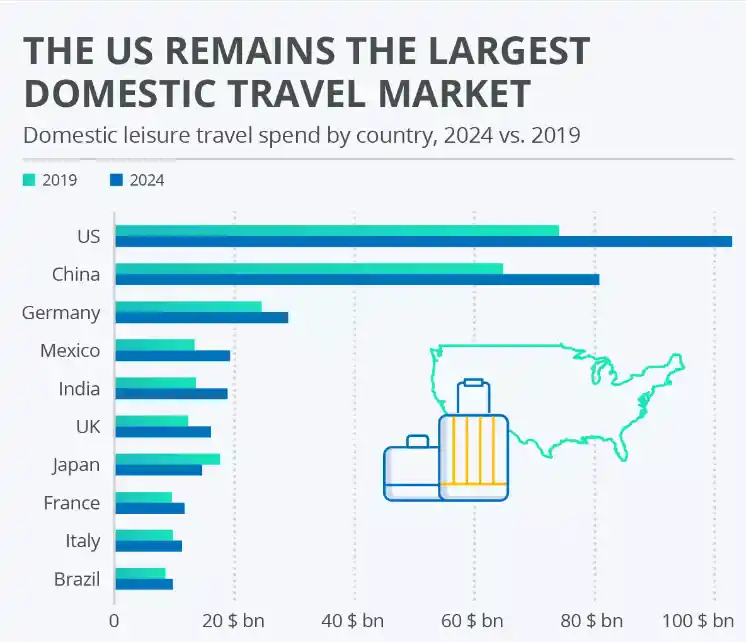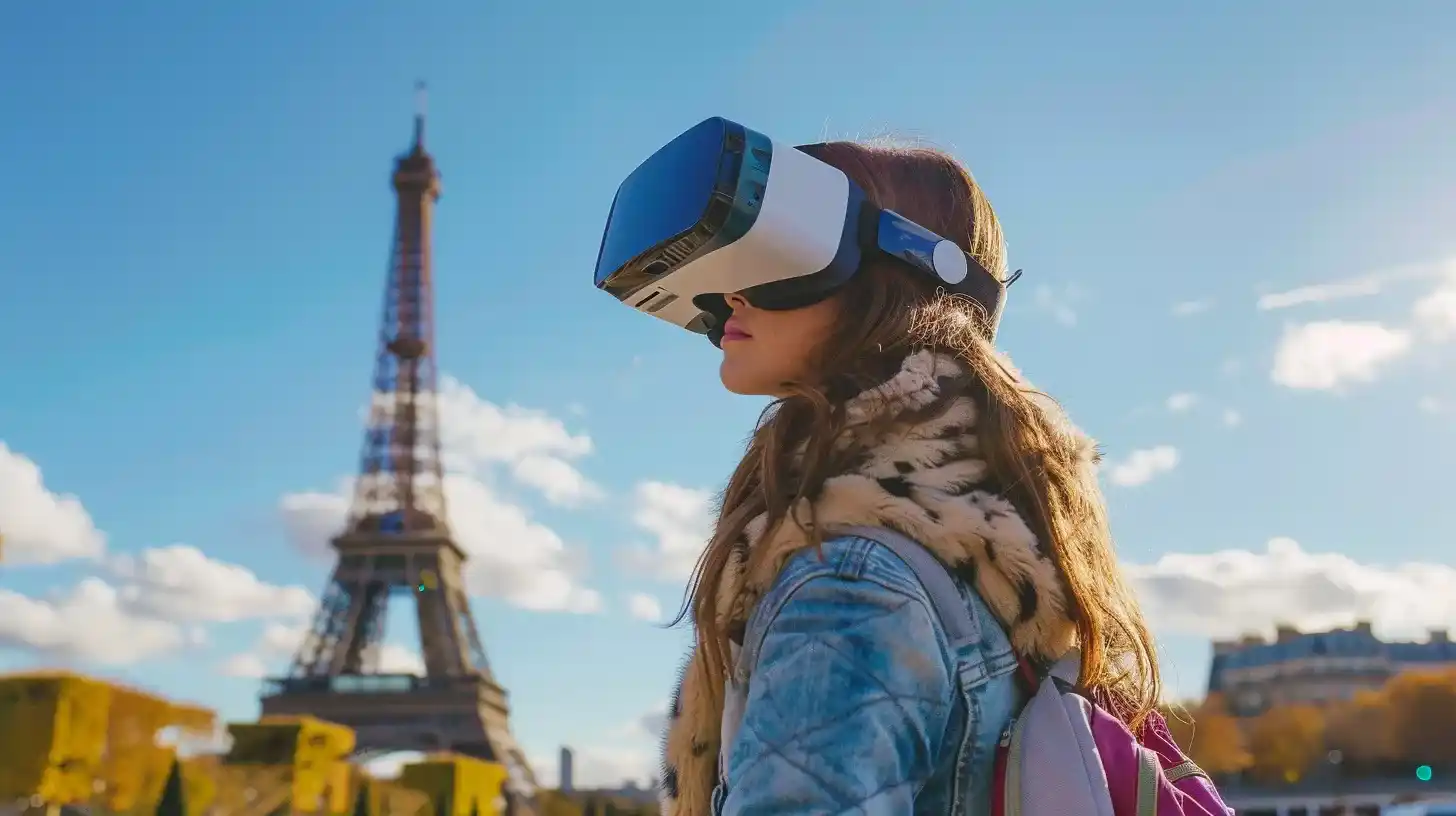Table of Contents
Introduction to AI in Tourism
AI in tourism is revolutionizing how we explore and experience the world, making travel more personalized, efficient, and seamless. By leveraging data and advanced algorithms, AI is changing the landscape of trip planning, customer service, safety, and operational efficiency within the tourism industry.
AI in Trip Planning
Personalized Recommendations
A major impact of AI in tourism is its ability to offer highly personalized travel recommendations. Platforms like Google Travel and TripAdvisor utilize AI algorithms to analyze user data, preferences, and past behaviors, suggesting destinations, accommodations, and activities tailored to individual interests. For businesses, integrating a trip management system alongside AI tools can further streamline travel planning and coordination.
- Data-Driven Insights: AI collects and analyzes data from various sources, such as social media, past travel history, and browsing behavior, to customize suggestions.
- Dynamic Pricing and Offers: AI helps travelers find the best deals by analyzing historical pricing trends and predicting future price movements, offering dynamic pricing options based on demand and availability.
Virtual Travel Assistants
AI in tourism is making trip planning easier with virtual travel assistants, such as chatbots and voice-activated assistants. These tools provide instant support, answer queries, and assist with booking flights, hotels, and activities.
- 24/7 Availability: AI assistants are available around the clock, providing real-time responses to inquiries, unlike human agents.
- Multi-Channel Support: These assistants operate across various platforms, including websites, mobile apps, and messaging services, ensuring broad accessibility.
Enhancing Customer Service with AI in Tourism
AI Chatbots and Customer Support
AI chatbots are becoming essential in AI in tourism, handling customer service interactions with quick and accurate responses to a wide range of travel-related questions. From flight status updates to reservation changes, chatbots streamline the customer service process.
- Efficient Problem Resolution: AI chatbots can resolve common issues without human intervention, reducing wait times and improving customer satisfaction.
- Language Translation: Advanced AI chatbots communicate in multiple languages, breaking down language barriers and enhancing the travel experience for international tourists. To implement these advanced AI capabilities effectively, many tourism businesses partner with a travel software development company that specializes in building custom chatbot solutions, booking systems, and customer engagement platforms tailored to the industry’s unique requirements.
Sentiment Analysis
Sentiment analysis driven by AI in tourism allows travel companies to monitor and analyze customer feedback from social media, reviews, and surveys. This helps businesses understand traveler sentiments, address issues promptly, and improve their services.
- Real-Time Feedback: AI provides real-time insights into customer opinions, enabling immediate adjustments.
- Improving Services: By identifying patterns and trends in feedback, companies can enhance their offerings and better meet customer expectations.

Smart Destinations and Experiences Through AI in Tourism
AI in Smart Cities
AI in tourism is a key component of developing smart cities, popular tourist destinations enhanced by connectivity and infrastructure. Smart cities use AI to manage resources efficiently, provide real-time information, and improve overall visitor experiences.
- Smart Traffic Management: AI optimizes traffic flow, reducing congestion and improving accessibility to tourist sites.
- Interactive Maps and Guides: AI-powered maps and virtual guides offer tourists personalized recommendations and real-time updates on attractions, dining options, and events.
Augmented Reality (AR) and Virtual Reality (VR)
AI enhances AR and VR experiences, providing immersive ways for tourists to explore destinations and attractions.
- Virtual Tours: AI-powered VR tours allow potential travelers to explore destinations virtually before booking, aiding in informed decision-making.
- Enhanced On-Site Experiences: AR apps use AI to overlay digital information on real-world views, providing historical context, translations, and interactive elements at tourist sites.
Operational Efficiency in the Tourism Industry with AI
Predictive Analytics for Demand Forecasting
Predictive analytics driven by AI in tourism transforms how the tourism industry forecasts demand and manages resources. By analyzing booking trends, economic indicators, and seasonal patterns, AI helps businesses optimize their operations.
- Capacity Planning: Hotels and airlines use predictive analytics to anticipate demand and adjust capacity, pricing, and staffing levels accordingly.
- Inventory Management: AI assists in managing inventory effectively by predicting stock levels for travel-related products and services.
Automated Processes
AI in tourism automates various operational processes, enhancing efficiency and accuracy.
- Check-In and Security: AI systems streamline check-in procedures at airports and hotels, using facial recognition and biometric data to expedite the process.
- Back-End Operations: AI automates tasks like data entry, billing, and customer relationship management, freeing up staff for more complex and customer-facing roles.
Enhancing Safety and Security Through AI in Tourism
AI in Surveillance and Monitoring
AI technologies are enhancing safety and security measures within the tourism industry by providing advanced surveillance and monitoring capabilities.
- Facial Recognition: AI-powered facial recognition systems are used at airports and tourist attractions to enhance security and streamline identification processes.
- Behavioral Analysis: AI analyzes patterns and behaviors to detect potential security threats, enabling proactive measures to prevent incidents.
Health and Safety Measures
In response to global health concerns, AI in tourism plays a crucial role in maintaining health and safety standards within the tourism sector.
- Health Monitoring: AI-driven health monitoring systems track and analyze health data from travelers, helping to prevent the spread of infectious diseases.
- Contact Tracing: AI tools assist in contact tracing efforts, identifying and notifying individuals who may have been exposed to health risks.
AI-Driven Marketing and Customer Engagement in Tourism
Targeted Marketing Campaigns
AI in tourism empowers companies to design highly targeted marketing campaigns based on user data, preferences, and behavior.
- Personalized Advertising: AI analyzes user data to deliver personalized ads that resonate with individual preferences, increasing engagement and conversion rates.
- Predictive Analytics: AI-driven predictive analytics help marketers identify potential customers and anticipate their travel needs and preferences. Even in the tourism industry, there are small and specific niches. For example, a tour agency focused on D-Day tours could use AI to find history enthusiasts interested in World War II. AI helps tailor ads and promotions to this audience, making marketing more effective and cost-efficient.

Social Media and Content Creation
AI tools are transforming how tourism companies manage their social media presence and create engaging content.
- Content Generation: AI can generate content, such as travel guides and blog posts, based on trending topics and user interests.
- Social Media Analysis: AI analyzes social media activity to gauge brand sentiment, track engagement, and identify opportunities for improvement.
Ethical and Privacy Considerations in AI in Tourism
Data Privacy
The increasing use of AI in tourism raises concerns about data privacy and security. It’s essential for tourism companies to implement robust data protection measures and adhere to regulations to safeguard traveler information.
- Data Encryption: AI systems should incorporate data encryption and secure storage to protect sensitive traveler information.
- Compliance with Regulations: Companies must comply with data privacy laws, such as GDPR, to ensure ethical handling of user data.
Ethical AI Use
The ethical implications of AI in tourism require careful consideration to avoid bias and ensure fair treatment of all travelers.
- Bias Mitigation: AI algorithms should be designed to minimize bias and ensure equitable treatment of all users, regardless of their background.
- Transparency: Tourism companies should be transparent about their use of AI and how it impacts customers, building trust and credibility.
Future Trends in AI in Tourism
Hyper-Personalization
The future of AI in tourism is likely to focus on hyper-personalization, where AI systems use extensive data to offer even more tailored experiences.
- Behavioral Insights: AI will analyze not only preferences but also behavioral patterns to anticipate and meet traveler needs more effectively.
- Real-Time Customization: AI will enable real-time customization of travel experiences, from adjusting itineraries on the go to providing personalized recommendations based on current location and activities.
Integration of AI with Emerging Technologies
Integrating AI in tourism with emerging technologies like blockchain, the Internet of Things (IoT), and 5G will further enhance the capabilities of the tourism industry.
- Blockchain for Security: Combining AI with blockchain can enhance security and transparency in transactions and data handling.
- IoT and Connectivity: AI and IoT will work together to provide seamless connectivity and enhanced experiences, such as smart luggage tracking and personalized room settings.
Conclusion
AI in tourism is profoundly transforming the industry by enhancing personalization, operational efficiency, customer service, and safety. As AI technologies continue to evolve, they will unlock new opportunities and redefine how we explore the world, making travel more accessible, enjoyable, and tailored to individual preferences. Embracing these innovations, while addressing ethical and privacy concerns, will be key to maximizing the benefits of AI in tourism.